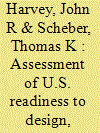| Srl | Item |
| 1 |
ID:
150097


|
|
|
|
|
| Summary/Abstract |
This report provides an assessment of the U.S. readiness posture to be able to design, develop, and produce new nuclear warheads or warheads with new military capabilities. Such a readiness posture is important to reduce risk over the long term for the United States and its allies. This report does not advocate any specific new nuclear capability. The focus is on a readiness capability and the steps needed to remediate a critical element of the U.S. security posture that, over the past two decades, has been documented repeatedly as being deficient. The report examines the policies of post-Cold War presidential administrations regarding maintaining a nuclear warhead design capability. In addition, it identifies capability shortfalls of the current U.S. nuclear enterprise and offers recommendations to address shortfalls—in particular, the intellectual capital on which the health of the current and future U.S. nuclear deterrent depends. Finally, it provides concrete recommendations to improve and preserve a U.S. nuclear readiness capability for the long term.
|
|
|
|
|
|
|
|
|
|
|
|
|
|
|
|
| 2 |
ID:
116346


|
|
|
|
|
| Publication |
2012.
|
| Summary/Abstract |
A commonly held view is that nonstate actors cannot be deterred. A historical review of deterrence vis-à-vis nonstate actors, however, shows that deterrence can be applied successfully to terrorist groups for some purposes and at some times. An examination of the sensitivities, vulnerabilities, and other characteristics of the core al-Qa'ida group suggests a combination of denial and punitive deterrent measures could be used to discourage this nonstate actor from attempting a mass-casualty attack.
|
|
|
|
|
|
|
|
|
|
|
|
|
|
|
|
| 3 |
ID:
077736


|
|
|
|
|
| Publication |
2007.
|
| Summary/Abstract |
Some critics of the U.S. strategy for strategic forces claim that this new strategy undermines the tenets of the Nuclear Non-Proliferation Treat (NPT). However, much of the criticism is based on outdated logic and errant characterizations of the strategy. Those who support the NPT and seek to limit nuclear proliferation should take a closer look at the U.S. strategy. They should find a lot to like about the new U.S. strategy. As NATO looks at options for its aging nuclear force in the emerging geopolitical environment, it may do well to consider a concept that parallels the new U.S. approach.
|
|
|
|
|
|
|
|
|
|
|
|
|
|
|
|